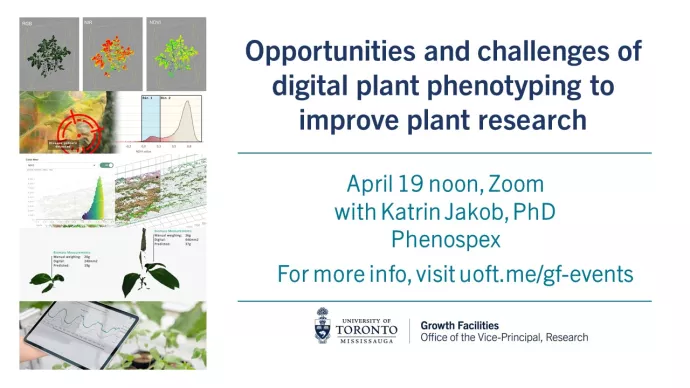
Date and Time: April 19, noon
Venue: Google meet (email vera.velasco@utoronto.ca for calendar invite)
Speaker: Katrin Jakob, PhD
Abstract:
In recent years, plant phenotyping has seen a shift from manual, laborious, destructive plant measurements to high throughput, nondestructive, automated phenotyping systems, often based on multi and hyperspectral cameras. Drones, mobile vehicles, robots and gantries are equipped with these cameras and other sensors and can measure thousands of plants or plots in a short time. These technologies provide objective data rather than manually measured subjective data and open up opportunities to improve plant measurements and the research areas this pertains to, from screening microbials, abiotic and biotic stress screening, breeding and many others. However, there are challenges when switching from manual to digital/HTP. Huge data files, complex data analytics, changes in standard experimental protocols are some of these challenges. In the presentation there will be a focus on Phenospex’ 3D laser and multispectral sensor, how it has been developed to address some of the challenges and its implementation for HTP for a wide range of research applications.
Funding source: UTM OVPR
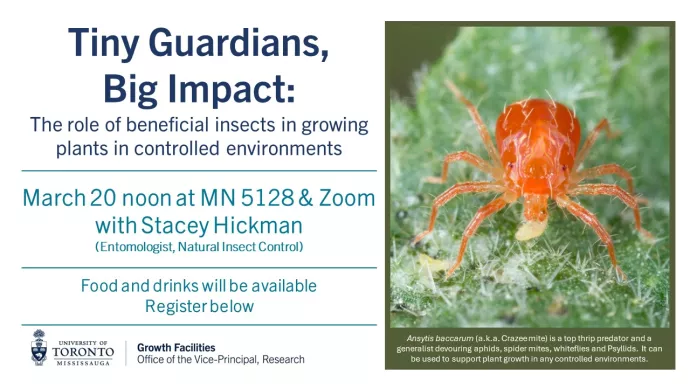
Date and Time: March 20, noon
Venue: MN 5128 and Zoom (link | ID 815 3052 0628)
Speaker: Stacey Hickman
Stacey is an experienced entomologist who specializes in the use of beneficial insects and nematodes for pest management. She is a reliable contact at Natural Insect Control and has been helping many of us with our pest problems.
Funding source: UTM OVPR
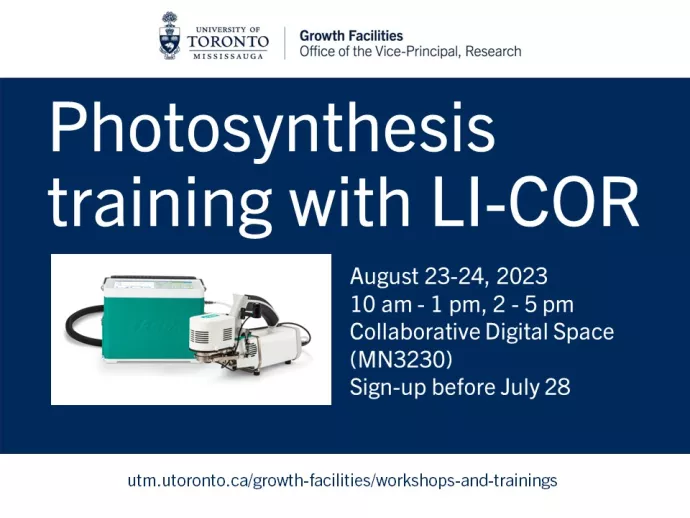
Date and Time: August 23 to 24, 2023 | 10 am to 1 pm, and 2 pm to 5 pm
Venue: Remote broadcast to Collaborative Digital Research Space (CDRS) at MN3233 and MN3235 (access through the hallway to the left before CDRS)
Trainor: Elizabeth Gordon, Sr. Technical Support Scientist from LI-COR
Scope:
- Fundamentals of making gas exchange and fluorescence measurements. Focus will be on leaf-level gas exchange
- LI-6800 hardware and software introduction
- Environmental control
- Making survey and response curve measurements
- Maintenance, calibration and troubleshooting
Other relevant info:
- We will have a LI-6800 with 6800-01A chamber set up in the venue. You are welcome to bring a plant that we can use during training.
- If you have never used your LI-6800, we recommend watching the following videos before the training. These videos will provide you with a brief overview of the system components and chemicals
- Unpacking The LI-6800 video here: https://www.licor.com/env/support/LI-6800/videos/unpacking-the-li-6800.html
- Introduction to the Chemicals video here: https://www.licor.com/env/support/LI-6800/videos/chemical-columns.html.
Funding sources: UTM OVPR and UTM Biology
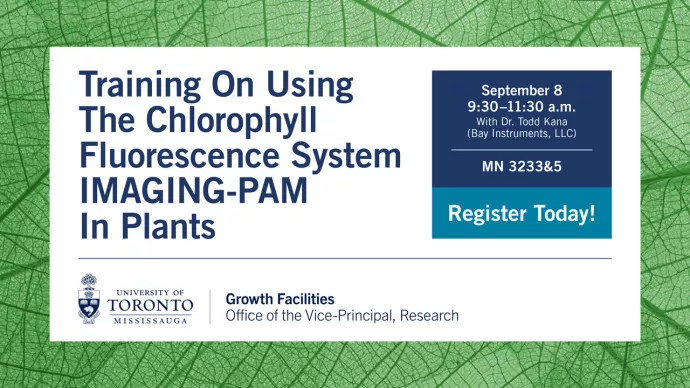
Training on "Using the chlorophyll fluorescence system IMAGING-PAM in plants"
We will focus on instrument setup and operation for plant leaves. We will discuss light curves and induction curves. The participants are expected to have a basic understanding of the concepts of photosynthetic light absorption, PSII and PSI, photosynthetic yield, variable fluorescence, NPQ, and qP. The tutorial (https://www.walz.com/files/downloads/manuals/junior-pam/SimpleExperiments01.pdf) is one place to go to learn such concepts.
Dates: September 8, 2022, 9:30 to 11:30 AM
Venue: UTM MN3233&5. The training will also be broadcasted live on Zoom, however, due to the hands-on nature of the equipment, interaction for online attendees might be limited.
Trainer: Dr. Todd M. Kana (Bay Instruments, LLC)
Host: Dr. Vera M.E. Velasco (UTM Growth Facilities)
Funding sources: UTM OVPR, UTM Growth Facilities, NSERC RTI
For more information on equipment, please visit Walz Imaging-PAM website and UTM Growth Facilities Imaging-PAM website.
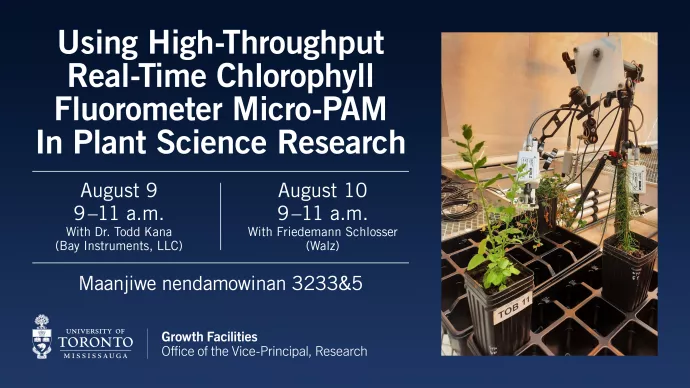
Day 1: August 9, 2022 with Dr. Todd Kana (Bay Insturments, LLC)
9:00 - 9:30 am Basics of chlorophyll fluorescence
9:30 - 11:00 am Familiarizing with WinControl
Day 2: August 10, 2022 with Friedemann Schlosser (Walz)
9:00 - 10:30 am Creating and runnning batch files
10:30 - 11:00 am Open discussion
Venue: UTM MN3233&5. The training will also be broadcasted live on Zoom, however, due to the hands-on nature of the equipment, interaction for online attendees might be limited.
Host: Dr. Vera M.E. Velasco (UTM Growth Facilities)
Funding sources: UTM OVPR, UTM Growth Facilities, NSERC RTI
For this training, we will focus on instrument setup and operation for plant leaves. We will discuss light curves and induction curves. The participants are expected to have a basic understanding of the concepts of photosynthetic light absorption, PSII and PSI, photosynthetic yield, variable fluorescence, NPQ, and qP. The tutorial (https://www.walz.com/files/downloads/manuals/junior-pam/SimpleExperiments01.pdf) is one place to go to learn such concepts. Other recommended study materials are as follows:
- Chlorophyll Fluorescence: The glow of plants
- Introduction to the light reactions of photosynthesis and chlorophyll fluorescence
Maxwell and Johnson (2000) Chlorophyll fluorescence—a practical guide
- Walz Micro-PAM Fluorometer
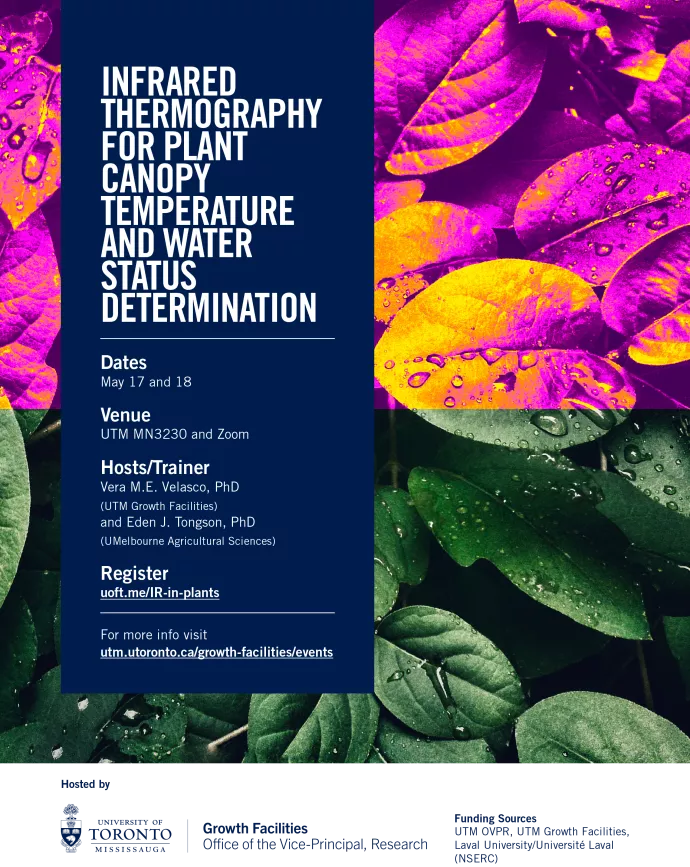
Infrared thermography for plant canopy temperature and water status determination
Temperature and water status are a few of the parameters used to study abiotic and biotic stressors in plants. Infrared thermal imaging is an emerging non-destructive technique used to visualize and quantify surface plant temperature against a background. In this two-day workshop, you will learn the theory and application of infrared thermal imaging in plant science. You will learn how to operate a thermal imaging camera, analyze thermal data including estimation of water status, and interpret results. Although this workshop is designed for plant research, non-plant researchers who would like to learn how to use FLIR camera are also welcome since infrared thermography is also used in studying insects like flies, fungi, et cetera.
Dates: May 17-18, 2022, 9 am to 5 pm
Venue: UTM Collaborative Digital Research Space MN3230 and Zoom
Hosts/Trainer: Vera M.E. Velasco Phd (UTM Growth Facilities) and Eden J. Tongson PhD (UMelbourne Agricultural Sciences)
| May 17 | May 18 (Bring your own laptop) |
|---|---|
9-11 am Theory with Eden | 9-12 am Data crunching with Eden |
11-12 am How to use the FLIR camera | 1-3 pm Students work on their data |
1-5 pm Students take their FLIR images atUTM Research Greenhouse, UTM surroundings | 3-5 pm Students present their data with Vera |
Funding sources: UTM OVPR, UTM Growth Facilities, University of Laval, NSERC
